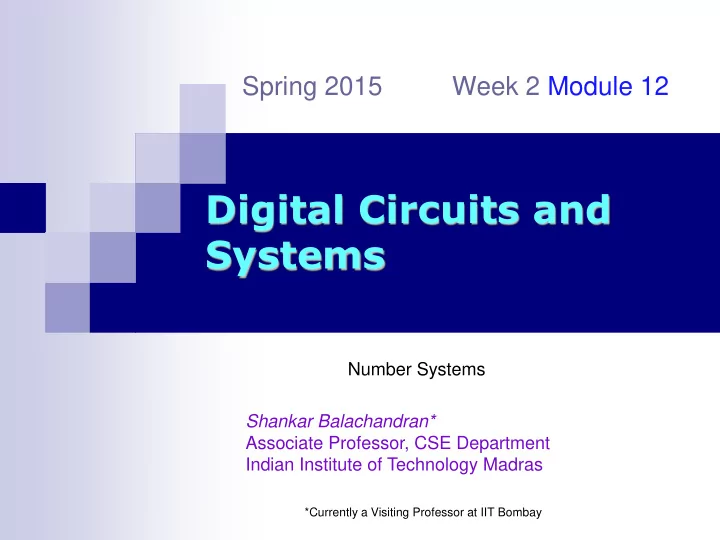

Spring 2015 Week 2 Module 12 Digital Circuits and Systems Number Systems Shankar Balachandran* Associate Professor, CSE Department Indian Institute of Technology Madras *Currently a Visiting Professor at IIT Bombay
Digits vs. bits Digits = powers of 10 … 100, 1 / 1000 … 1 / 10 , 1 / 100 , 10, 1, … 10 2 , 10 -3 … 10 1 , 10 0 , 10 -1 , 10 -2 , Ex: (36.25) 10 = 3*10 + 6*1 + 2* 1 / 10 + 5* 1 / 100 Bits = powers of 2 … 8, 1 / 8 … 1 / 2 , 1 / 4 , 4, 2, 1, … 2 3 , 2 -3 … 2 2 , 2 1 , 2 0 , 2 -1 , 2 -2 , Ex: (100100.01) 2 = 1*32 + 1*4 + 1* 1 / 4 Number Systems 2
Binary to decimal add powers that have a 1 (101001) 2 = 32 + 8 + 1 (0.1001) 2 = 1 / 2 + 1 / 16 (10110.1011) 2 = ? 16 + 4 + 2 + 1 / 2 + 1 / 8 + 1 / 16 = 22.6875 Number Systems 3
Decimal to binary Left of decimal point Repeatedly divide integer part by 2 until you get 0 Read remainders bottom to up 22 = (?) 2 (10110) 2 22 11 R 0 5 R 1 2 R 1 1 R 0 0 R 1 Number Systems 4
Decimal to binary Right of decimal point Repeatedly multiply fractional part by 2 until you get 1 Read integer portion top to bottom 0.8125 = (?) 2 (0.1101) 2 0.8125 1.6250 1.25 0.5 1.0 Number Systems 5
Decimal to binary What if there are both left and right of the decimal point? Do them separately and combine 22.8125 = (?) 2 (10110.1101) 2 up down 0.8125 22 1.6250 11 R 0 1.25 5 R 1 0.5 2 R 1 1.0 1 R 0 0 R 1 Number Systems 6
Exercises 3.25 = (?) 2 0.0101 = (?) 10 0.3 = (?) 2 114.25 = (?) 2 1010001.01101 = (?) 10 0101.0101 = (?) 10 1010.0101 = (?) 10 Number Systems 7
Hexadecimal base Hex digits = powers of 16 … 256, 16, 1 / 256 … 1 / 16 , 1, … 16 2 , 16 1 , 16 -1 , 16 -2 … 16 0 , use digits 0-9, A-F A=10, B=11, C=12, D=13, E=14, F=15 Often preceded by 0x Also with a base explicitly written (24.4) 16 Ex: (24.4) 16 = 2*16 + 4*1 + 4* 1 / 16 Number Systems 8
dec. hex binary 0 0 0000 Hexadecimal base 1 1 0001 2 2 0010 3 3 0011 4 4 0100 Hex (hexadecimal) 5 5 0101 Hex digit is a group of 4 bits 6 6 0110 Memorize this table!! 7 7 0111 8 8 1000 9 9 1001 10 A 1010 11 B 1011 12 C 1100 13 D 1101 14 E 1110 15 F 1111 Number Systems 9
Binary to Hex Hex (hexadecimal) Group from decimal point outward Pad with zeros to get groups of 4 (1101101001010.101001) 2 (0001 1011 0100 1010 . 1010 0100) 2 1 B 4 A . A 4 (1101101001010.101001) 2 = (1B4A.A4) 16 Number Systems 10
Octal base Octal digits = powers of 8 … 64, 1 / 64 … 1 / 8 , 8, 1, … 8 2 , 8 -2 … 8 1 , 8 0 , 8 -1 , use digits 0-7 sometimes preceded by 0 Also with a base explicitly written(24.4) 8 Ex: (44.2) 8 = 4*8 + 4*1 + 2* 1 / 8 Number Systems 11
Octal base dec. octal binary 0 0 000 1 1 001 2 2 010 3 3 011 Octal 4 4 100 Octal digits are groups of 3 bits 5 5 101 Pad with zeros 6 6 110 7 7 111 Number Systems 12
Binary to Octal Octal Group from decimal point outward Pad with zeros to get groups of 3 (1101101001010.101001) 2 (001 101 101 001 010 . 101 001) 2 1 5 5 1 2 . 5 1 (1101101001010.101001) 2 = (15512.51) 8 Number Systems 13
Other conversions What about other conversions such as: Octal Hex Decimal Hex … Use other conversions you already know Octal Binary Hex Decimal Binary Hex Number Systems 14
End of Week 2: Module 12 Thank You Number Systems 15
Recommend
More recommend